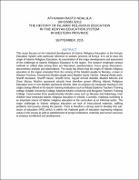| dc.description.abstract | ABSTRACT
This study focuses on the historical development of Islamic Religious Education in the Kenyan Education System with particular reference to western province of Kenya. It is set to trace the origin of Islamic Religious Education, its examination of the major developments and assessment of the challenges to Islamic Religious Education in the region. The research employed various methods to collect data among them are Interviews, questionnaires, Focus group discussions, documentary analysis and observations. The study has shown that the origin of Islamic religious education in the region emanated from the coming of the Muslim people to Mumias, a town in Western Province. Among this Muslim people were Maalim Gaziti, Hamisi, Mwanji Akida Jeshi, Shariff Abubakar, Shariff Hassan, Shariff Omar, Sayyid Ahmed Abdalla, Maalim Mtondo and Omar Mazoa. Muslim sponsored schools have therefore grown offering Islamic Religious Education even in non-Muslim sponsored schools. Also on progress are manpower training in the subject being offered in the teacher training institutions such as Kibabi Diploma Teachers Training college, Kibabii University College, Masinde Muliro University and Bungoma Teachers Training College. Communities from predominantly Muslim areas such as Mumias and Kakamega, their children have embraced Islamic religious education in schools. Currently, madrassa schooling is an important source of Islamic religious education in the curriculum as an informal sector. The major challenges to Islamic religious education are lack of instructional materials, staffing problems and poverty among the parents. There is therefore a strong need to develop this sub-sector of education (IRE) which is within the National goals of education expressing religious values in the society as well as establishment of proper institutions, materials and human resources to embrace enrollment and development. | en_US |

